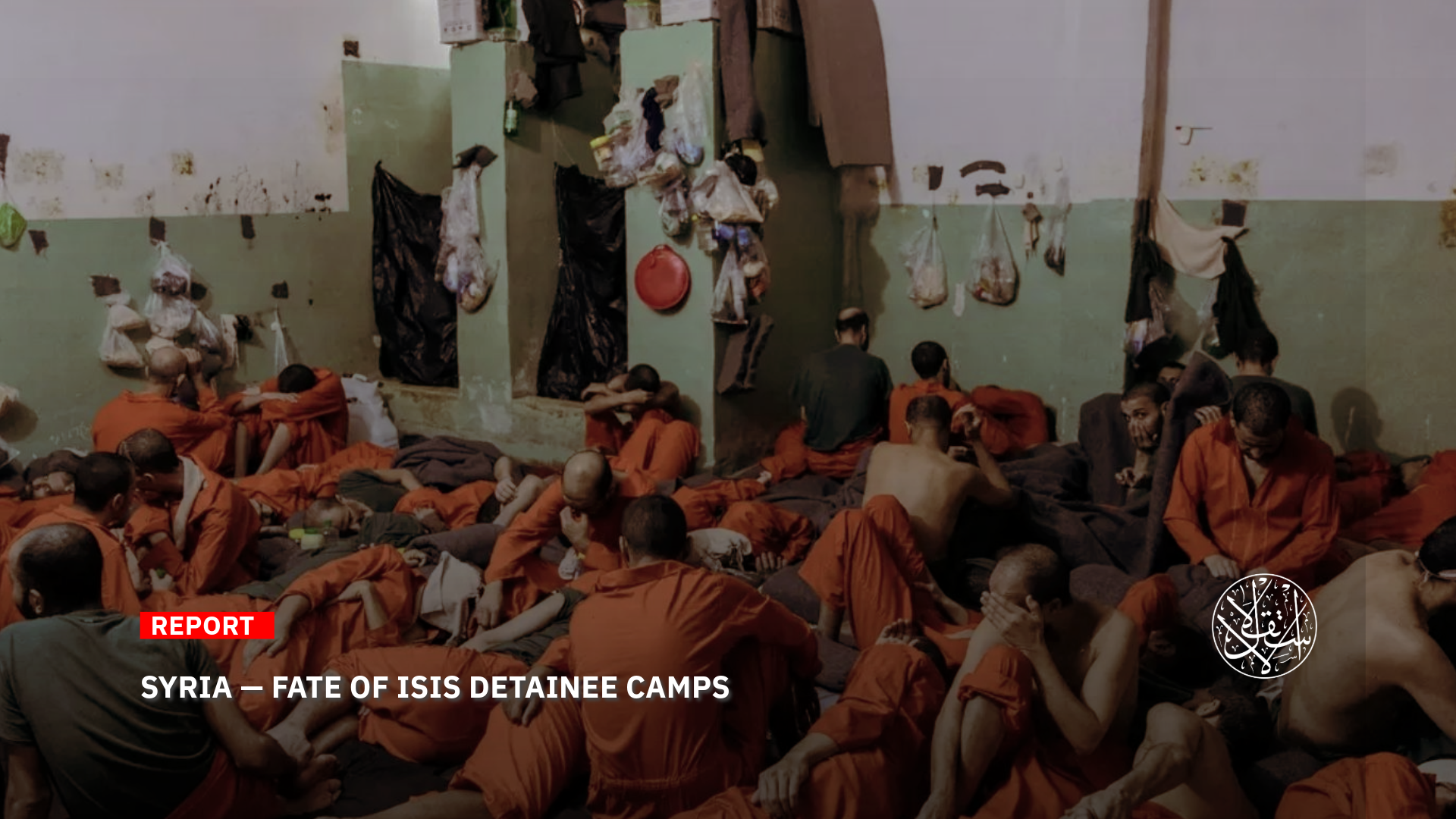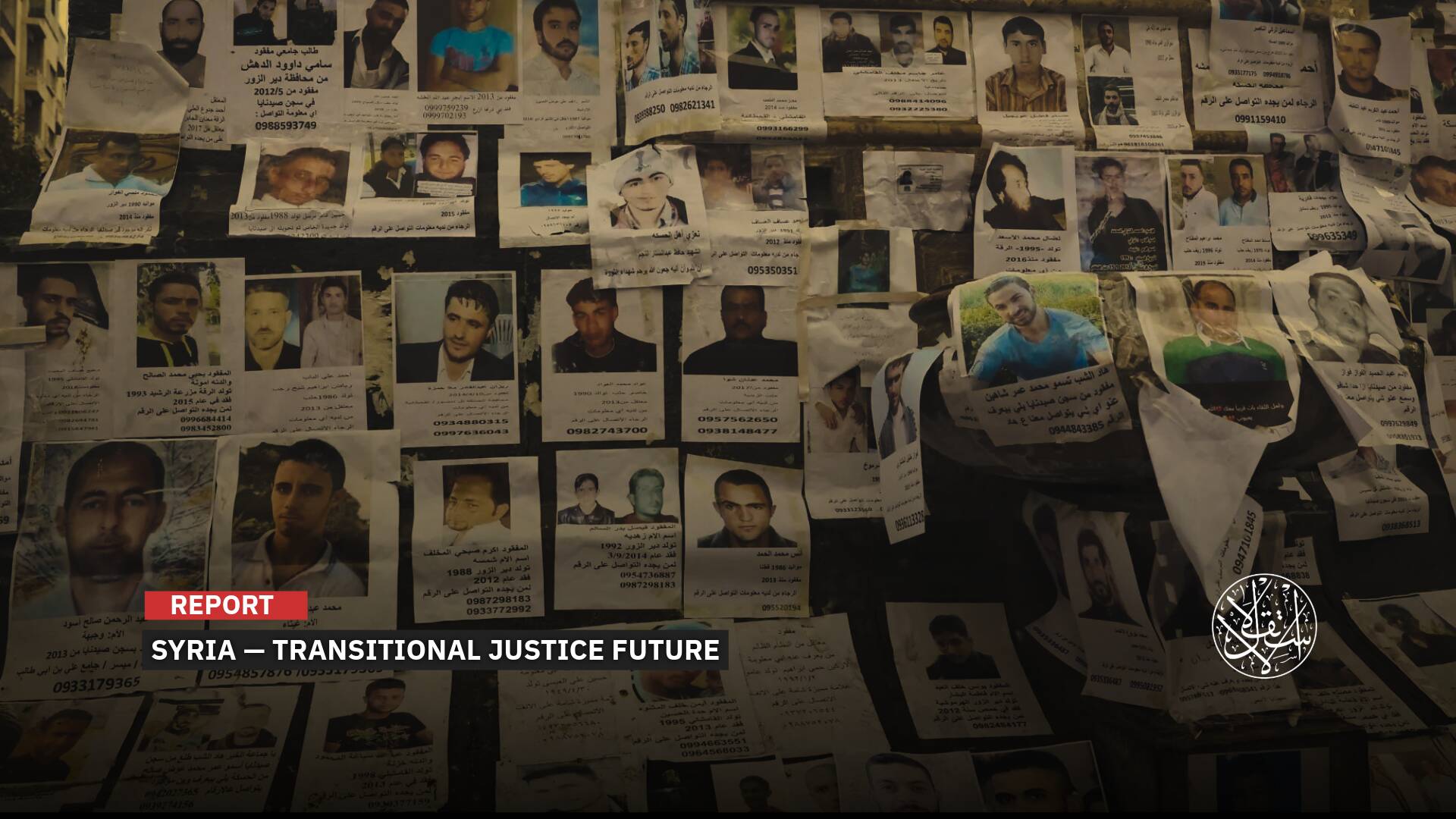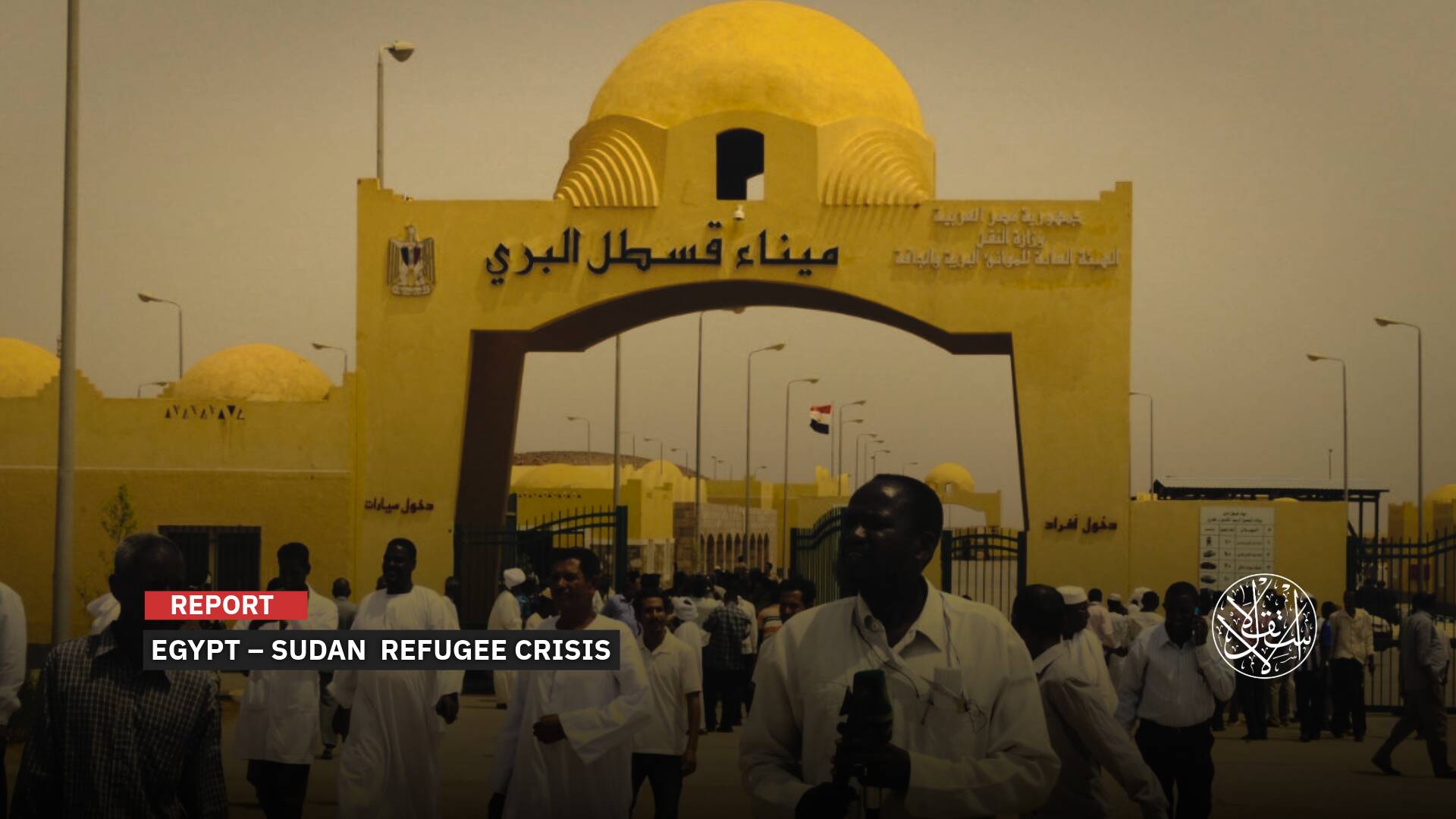Negotiations In Damascus with SDF: What is the Fate of ISIS Detainee Camps in Syria?

The Syrian state continues to arrest followers of the ISIS organization.
The new Syrian state continues negotiations with the Syrian Democratic Forces (SDF) to achieve the full integration of the latter’s territories with the rest of the country.
While many of the issues controlled by the U.S.-backed SDF, such as oil, are seeing progress in talks with Damascus, the matter of camps and prisons holding ISIS fighters and their families remains particularly sensitive, given its inherent security concerns.
ISIS Detention
The Syrian Democratic Forces (SDF), with full logistical, military, and intelligence support from the United States, manage the prisons where ISIS fighters are held in the city of Hasakah in northeastern Syria.
"Since then, the numbers were almost 54,000 in the camp,” said Michael Kurilla, the U.S. operations commander in the Middle East.
He stated that Iraqis make up about half of the camp’s population, at 27,000 residents, "in addition to 18,000 Syrians, and about 8,500 foreign occupants."
“Those foreigners are defined as non-Iraqi and non-Syrian. That is where the challenge is right now,” he added.
The United Nations confirms that the foreign families of ISIS fighters come from 60 different countries, including 3,177 women, with the remainder being children.
Meanwhile, the older children have been placed in the juvenile prison in the village of Tel Maarouf, in the northeastern part of the province.
The U.S. forces have designated the so-called Roj camp near the town of al-Malikiyah in northern Hasakah as a highly sensitive security facility, where only the wives and children of senior ISIS leaders and emirs are held.
Additionally, the SDF has incarcerated a portion of ISIS fighters in the Guweiran and Industry prisons in Hasakah, as well as the Kampa Bulgar prison located east of the town of Shaddadi, south of Hasakah.
All of these individuals were gathered after intense battles between ISIS and the SDF, fully backed by the international coalition.
On March 23, 2019, ISIS was forced to surrender, with hundreds of its fighters, along with their wives and children, handing themselves over in the group's final stronghold in the town of Baghuz, in Deir ez-Zor province.
Since then, many European countries have ignored efforts to repatriate their citizens or address the issue of the children of ISIS fighters held in detention.
Furthermore, their parliaments have refrained from discussing the matter, citing concerns over the rising influence of the far right and growing Islamophobia.

SDF Agreement
On March 11, 2025, Syrian President Ahmed al-Sharaa and SDF commander Mazloum Abdi signed an agreement that mandates the integration of all civilian and military institutions under the Kurdish autonomous administration into the framework of the Syrian state, including border crossings, airports, and oil and gas fields.
The agreement, which consists of eight articles, stipulates that joint committees will work to implement its provisions before the end of 2025.
The agreement also stipulates support for the Syrian state in its fight against the remnants of the Assad regime and all threats to its security and unity.
Later, Abdi stated in a post on X that "the agreement is a real opportunity to build a new Syria that embraces all of its components and ensures good neighborly relations."
"In this critical period, we are working together to ensure a transitional phase that reflects our people’s aspirations for justice and stability," he added.
The first round of negotiations between Damascus and the SDF took place following the new agreement on March 20, 2025.
Hussein al-Salama, head of the Syrian government committee tasked with implementing the agreement, met with Mazloum Abdi and U.S. officials at a military base in the town of Shaddadi, in the Hasakah countryside.
In recent years, the SDF has failed to resolve the issue of foreign ISIS detainees by repatriating them to their home countries for trial.
The SDF had aimed to empty the camps of women and children associated with ISIS fighters and leaders, seeking their rehabilitation in their respective countries, which span across 60 nations, according to security statistics published in mid-2024.
Countries such as Iraq, Russia, Spain, Tajikistan, and Australia have been conducting phased operations to repatriate the children and families of ISIS fighters.
Ali Abdullah, head of the National Committee for Implementing the Counter-Violent Extremism Strategy under Iraq's National Security, stated that 16,000 Iraqis remain inside the al-Hol camp in the Hasakah countryside.
"Efforts are underway to repatriate the Iraqis from the camp," Abdullah told the press on March 22, 2025.

Funding Uncertainty
It was notable that following the fall of Bashar al-Assad’s regime on December 8, 2024, the United States announced plans to reduce its support for ISIS prisons in northeastern Syria.
Sources close to the U.S.-based NGO Blumont, which operates detention camps in the region, report that non-American donor funding is insufficient to sustain its operations.
The Trump administration reportedly gave the organization a 90-day deadline following the cessation of aid in January 2025, while pressuring its allies to help reduce the number of camps.
The Blumont Relief and Development Organization will be unable to continue its role in managing the al-Hol and Roj camps if the U.S. State Department halts its funding.
The organization, which provides essential services in the camps, operates under a waiver issued by U.S. Secretary of State Marco Rubio on January 28, 2025.
The waiver exempted organizations offering life-saving humanitarian aid from a previous directive to cease operations issued on January 24, 2025.
Blumont was informed that it could continue its operations during a review period of 90 days, starting January 20, 2025, but it has not received any guarantees regarding what will follow.
While Blumont receives funding from a range of European donor governments for its work in Syria, including the UK, France, and Denmark, only U.S. grants are sufficient to fund the camp management and coordination team.
According to its 2023 annual report, the United States provided nearly 80% of Blumont's global funding, amounting to around $76 million.
Blumont has declined to disclose the number of people it employs at the al-Hol and Roj camps, though the latest employee data published on the organization’s website in December 2019 indicated that it had hired 400 staff members in the region.
Both camps are guarded by Syrian Democratic Forces (SDF) soldiers, supported by approximately 2,000 troops from the U.S. Central Command.
Sources close to the al-Hol camp told The Intelligence Online, in a report published on March 18, 2025, that if the camp coordination grant from the Office of Population and Refugee Management is withdrawn by late April 2025, they will be forced to consider a full withdrawal from the camp.
Before the signing of the SDF agreement, the group's media spokesman, Siamand Ali, stated in press remarks in January that any negotiations with the Damascus administration over sensitive issues such as ISIS detainees and their families in al-Hol and Roj camps would require comprehensive deliberations to ensure alignment with the interests of all involved parties, with the aim of maintaining security in their regions and the broader area.

Regional Cooperation
In this context, military analyst and expert Colonel Ismail Ayoub told Al-Estiklal that "if the SDF integrates with the new Syrian state, there will be solutions for all outstanding issues, with the issue of prisons housing ISIS fighters and their families at the top of the list."
"Any final agreement between the SDF and the Syrian state will place those prisons under Damascus' control."
"It seems that there is an ongoing process to transfer all remaining ISIS fighters and their families of Iraqi nationality to Baghdad, and thus, the remaining Syrians and foreigners will fall under the responsibility of the Syrian state."
"The issue of ISIS prisons will be considered part of the broader file of combating ISIS on Syrian soil, a commitment made by the new leadership to Western countries."
"The only path in line with international law is the repatriation of ISIS fighters to their home countries for rehabilitation, reintegration, and prosecution," Ayoub noted.
Richard Barrett, the former British director of counterterrorism at the UK intelligence agency, told the Foreign Affairs Committee of the British House of Commons in January 2025 that the repatriation of citizens from Syria is a "legal obligation" for states.
"I believe that one area where we should engage is dealing with British citizens, for whatever reason, in camps in northeastern Syria. The only thing we can offer the new Syrian government is the notion that the rule of law is effective and that community action can address security issues," Barrett said.
The Syrian state continues to arrest ISIS followers who are in hiding or are deemed likely to carry out terrorist acts.
On January 11, 2025, Syrian security forces thwarted an attempt by a cell of four individuals to carry out an attack at the Sayyida Zaynab shrine south of Damascus.
At the time, Syrian intelligence stated that the cell was affiliated with ISIS, and weapons, ammunition, Lebanese documents, and foreign currency were seized from them.
“The United States has shared secret intelligence on threats from the Islamic State with the new government in Syria,” the U.S. officials revealed to The Washington Post just days after the foiled operation.
Syria's neighboring countries have shown significant cooperation with the Syrian state in combating ISIS following al-Assad's fall.
During his participation in the International Conference on Syria in Paris in February 2025, Turkish Deputy Foreign Minister, Nuh Yilmaz, stated that Ankara is working to form a quadrilateral coalition against ISIS, comprising Turkiye, Iraq, Jordan, and Syria, to prevent the group from threatening the region once again.
Sources
- The agreement between the Syrian state and the Syrian Democratic Forces (SDF) [Arabic]
- Hussein Al-Salama to Syria TV: Our discussions with the SDF aim at the unity of Syrian territory [Arabic]
- Iraqi official: 16,000 citizens remain in Al-Hol camp in northeastern Syria [Arabic]
- The SDF refuses to hand over ISIS detainees to Damascus without security guarantees [Arabic]










